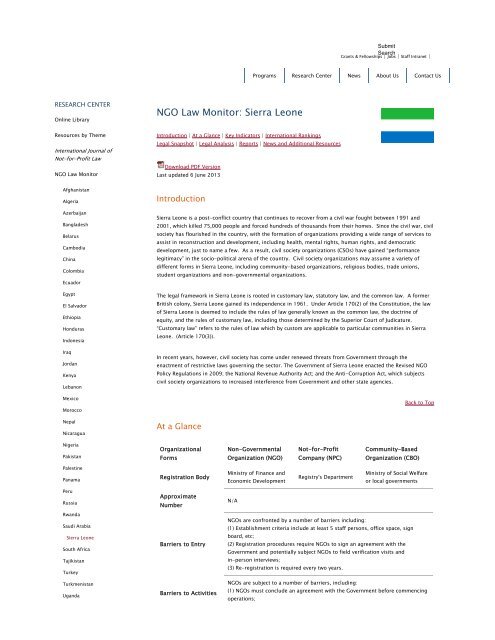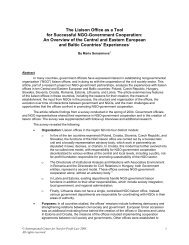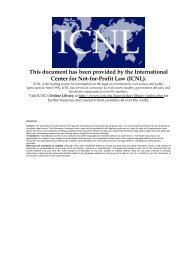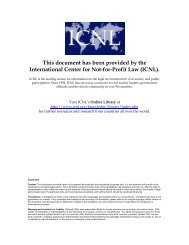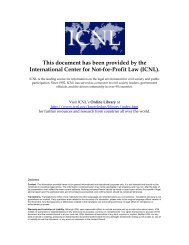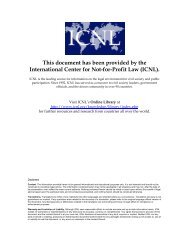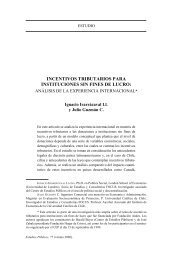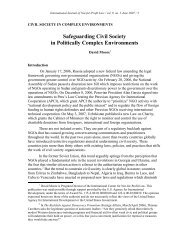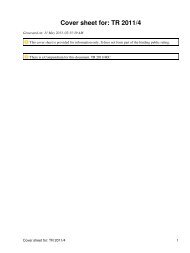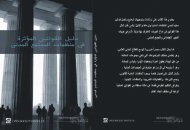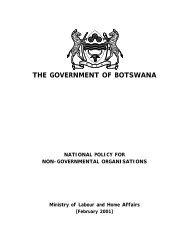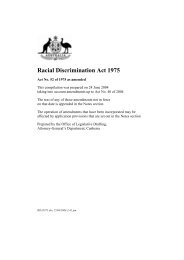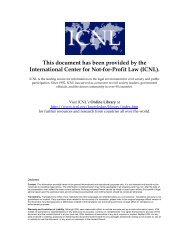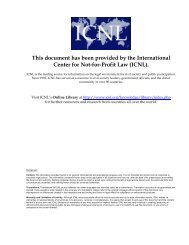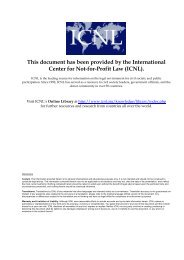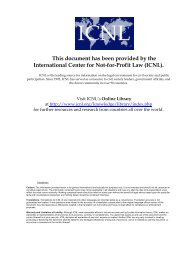Sierra Leone - NGO Law Monitor - Research Center - ICNL - The ...
Sierra Leone - NGO Law Monitor - Research Center - ICNL - The ...
Sierra Leone - NGO Law Monitor - Research Center - ICNL - The ...
Create successful ePaper yourself
Turn your PDF publications into a flip-book with our unique Google optimized e-Paper software.
Submit<br />
Search<br />
Grants & Fellowships | Jobs | Staff Intranet |<br />
Programs <strong>Research</strong> <strong>Center</strong> News About Us Contact Us<br />
RESEARCH CENTER<br />
Online Library<br />
<strong>NGO</strong> <strong>Law</strong> <strong>Monitor</strong>: <strong>Sierra</strong> <strong>Leone</strong><br />
Resources by <strong>The</strong>me<br />
International Journal of<br />
Not-for-Profit <strong>Law</strong><br />
<strong>NGO</strong> <strong>Law</strong> <strong>Monitor</strong><br />
Introduction | At a Glance | Key Indicators | International Rankings<br />
Legal Snapshot | Legal Analysis | Reports | News and Additional Resources<br />
Download PDF Version<br />
Last updated 6 June 2013<br />
Afghanistan<br />
Algeria<br />
Azerbaijan<br />
Bangladesh<br />
Belarus<br />
Cambodia<br />
China<br />
Colombia<br />
Ecuador<br />
Egypt<br />
El Salvador<br />
Ethiopia<br />
Honduras<br />
Indonesia<br />
Iraq<br />
Jordan<br />
Kenya<br />
Lebanon<br />
Mexico<br />
Morocco<br />
Nepal<br />
Nicaragua<br />
Introduction<br />
<strong>Sierra</strong> <strong>Leone</strong> is a post-conflict country that continues to recover from a civil war fought between 1991 and<br />
2001, which killed 75,000 people and forced hundreds of thousands from their homes. Since the civil war, civil<br />
society has flourished in the country, with the formation of organizations providing a wide range of services to<br />
assist in reconstruction and development, including health, mental rights, human rights, and democratic<br />
development, just to name a few. As a result, civil society organizations (CSOs) have gained “performance<br />
legitimacy” in the socio-political arena of the country. Civil society organizations may assume a variety of<br />
different forms in <strong>Sierra</strong> <strong>Leone</strong>, including community-based organizations, religious bodies, trade unions,<br />
student organizations and non-governmental organizations.<br />
<strong>The</strong> legal framework in <strong>Sierra</strong> <strong>Leone</strong> is rooted in customary law, statutory law, and the common law. A former<br />
British colony, <strong>Sierra</strong> <strong>Leone</strong> gained its independence in 1961. Under Article 170(2) of the Constitution, the law<br />
of <strong>Sierra</strong> <strong>Leone</strong> is deemed to include the rules of law generally known as the common law, the doctrine of<br />
equity, and the rules of customary law, including those determined by the Superior Court of Judicature.<br />
“Customary law” refers to the rules of law which by custom are applicable to particular communities in <strong>Sierra</strong><br />
<strong>Leone</strong>. (Article 170(3)).<br />
In recent years, however, civil society has come under renewed threats from Government through the<br />
enactment of restrictive laws governing the sector. <strong>The</strong> Government of <strong>Sierra</strong> <strong>Leone</strong> enacted the Revised <strong>NGO</strong><br />
Policy Regulations in 2009; the National Revenue Authority Act; and the Anti-Corruption Act, which subjects<br />
civil society organizations to increased interference from Government and other state agencies.<br />
Back to Top<br />
At a Glance<br />
Nigeria<br />
Pakistan<br />
Organizational<br />
Forms<br />
Non-Governmental<br />
Organization (<strong>NGO</strong>)<br />
Not-for-Profit<br />
Company (NPC)<br />
Community-Based<br />
Organization (CBO)<br />
Palestine<br />
Panama<br />
Registration Body<br />
Ministry of Finance and<br />
Economic Development<br />
Registry's Department<br />
Ministry of Social Welfare<br />
or local governments<br />
Peru<br />
Russia<br />
Rwanda<br />
Saudi Arabia<br />
<strong>Sierra</strong> <strong>Leone</strong><br />
South Africa<br />
Tajikistan<br />
Turkey<br />
Turkmenistan<br />
Uganda<br />
Approximate<br />
Number<br />
Barriers to Entry<br />
Barriers to Activities<br />
N/A<br />
<strong>NGO</strong>s are confronted by a number of barriers including:<br />
(1) Establishment criteria include at least 5 staff persons, office space, sign<br />
board, etc;<br />
(2) Registration procedures require <strong>NGO</strong>s to sign an agreement with the<br />
Government and potentially subject <strong>NGO</strong>s to field verification visits and<br />
in-person interviews;<br />
(3) Re-registration is required every two years.<br />
<strong>NGO</strong>s are subject to a number of barriers, including:<br />
(1) <strong>NGO</strong>s must conclude an agreement with the Government before commencing<br />
operations;
Back to Top<br />
Key Indicators<br />
Population 6,440,053<br />
Capital<br />
Type of Government<br />
Life Expectancy at Birth<br />
Literacy Rate<br />
Freetown<br />
Constitutional Democracy<br />
Male: 38.92 years<br />
Female: 43.64 years<br />
Male: 46.9%<br />
Female: 24.4%<br />
Religious Groups Muslims: 60%; Christian: 10%; indigenous beliefs: 30%<br />
Ethnic Groups<br />
20 African ethnic groups: 90% (Temne: 30%, Mende: 30%, other: 30%); Creole:<br />
10% (descendants of freed slaves who were settled in the Freetown area in the<br />
late 18th century); refugees from Liberia's recent civil war; small number of<br />
Europeans, Lebanese, Pakistanis, and Indians<br />
GDP per capita $900<br />
Source: <strong>The</strong> World Factbook. Washington, DC: Central Intelligence Agency, 2009.<br />
Back to Top<br />
International Rankings<br />
Ranking Body<br />
Rank<br />
Ranking Scale<br />
(best – worst<br />
possible)<br />
UN Human Development Index 180 1 – 182<br />
World Bank Rule of <strong>Law</strong> Index 14.8 100 – 0<br />
World Bank Voice & Accountability Index 38.5 100 – 0<br />
Transparency International 146 1 – 180<br />
Freedom House: Freedom in the World<br />
Status: Partly Free<br />
Political Rights: 3<br />
Civil Liberties: 3<br />
Free/Partly Free/Not<br />
Free<br />
1 – 7<br />
1 – 7<br />
Foreign Policy: Failed States Index 32 177 – 1<br />
Back to Top<br />
Legal Snapshot<br />
International and Regional Human Rights Agreements<br />
Key International Agreements Ratification* Year<br />
International Covenant on Civil and Political Rights (ICCPR) Yes 1996<br />
Optional Protocol to ICCPR (ICCPR-OP1) Yes 1996<br />
International Covenant on Economic, Social, and Cultural Rights (ICESCR) Yes 1996<br />
Optional Protocol to ICESCR (OP-ICESCR) No --
International Convention on the Elimination of All Forms of Racial<br />
Discrimination (ICERD)<br />
Yes 1967<br />
Convention on the Elimination of All Forms of Discrimination Against<br />
Women (CEDAW)<br />
Yes 1988<br />
Optional Protocol to the Convention on the Elimination of Discrimination<br />
Against Women<br />
No --<br />
Convention on the Rights of the Child (CRC) Yes 1990<br />
International Convention on the Protection of the Rights of All Migrant<br />
Workers and Members of their Families (ICRMW)<br />
No --<br />
Convention on the Rights of Persons with Disabilities (CRPD) No --<br />
Regional Treaties<br />
African Charter on Human and Peoples' Rights Yes 1983<br />
African Charter on the Rights and Welfare of the Child Yes 2002<br />
Treaty Establishing the African Economic Community Yes 2001<br />
Protocol to the African Charter on Human and Peoples' Rights on the<br />
Rights on Women in Africa<br />
No --<br />
Protocol to the African Charter on Human and Peoples' Rights on the<br />
Establishment of an African Court on Human and Peoples' Rights<br />
No --<br />
* Category includes ratification, accession, or succession to the treaty<br />
Constitutional Framework<br />
<strong>The</strong> current Constitution of <strong>Sierra</strong> <strong>Leone</strong> was approved by Parliament in 1991 and is significant in that it<br />
re-established a multi-party system.<br />
Relevant constitutional provisions include the following:<br />
Article 25 Protection of freedom of expression and the press:<br />
Except with his own consent, no person shall be hindered in the enjoyment of his freedom of expression, and<br />
for the purpose of this section the said freedom includes the freedom to hold opinions and to receive and<br />
impart ideas and information without interference, freedom from interference with his correspondence,<br />
freedom to own, establish and operate any medium for the dissemination of information, ideas and opinions,<br />
and academic freedom in institutions of learning:<br />
Provided that no person other than the Government or any person or body authorised by the President shall<br />
own, establish or operate a television or wireless broadcasting station for any purpose whatsoever.<br />
Nothing contained in or done under the authority of any law shall be held to be inconsistent with or in the<br />
contravention of this section to the extent that the law in question makes provision—<br />
a. which is reasonably required—<br />
i. in the interests of defence, public safety, public order, public<br />
morality or public health; or<br />
ii. for the purpose of protecting the reputations, rights and freedoms of<br />
other persons, preventing the disclosure of information received in<br />
confidence, maintaining the authority and independence of the courts,<br />
or regulating the telephony, telegraphy, telecommunications, posts,<br />
wireless broadcasting, television, public exhibitions or public<br />
entertainment; or<br />
b. which imposes restrictions on public officers or members of a defence force;
and except in so far as that provision or, as the case may be, the thing done under the authority<br />
thereof, is shown not to be reasonably justifiable in a democratic society.<br />
Article 26 Protection of freedom of assembly and association:<br />
Except with his own consent, no person shall be hindered in the enjoyment of his freedom of assembly and<br />
association, that is to say, his right to assemble freely and associate with other persons and in particular to<br />
form or belong to any political party, trade unions or other economic, social or professional associations,<br />
national or international, for the protection of his interests.<br />
Nothing contained in or done under the authority of any law shall be held to be inconsistent with or in<br />
contravention of this section to the extent that the law in question makes provision—<br />
a. which is reasonably required—<br />
i. in the interests of defence, public safety, public order, public morality,<br />
public health, or provision for the maintenance of supplies and services<br />
essential to the life of the community; or<br />
ii. for the purpose of protecting the rights and freedoms of other<br />
persons; or<br />
b. which imposes restrictions upon public officers and upon members of a defence<br />
force; or<br />
c. which imposes restrictions on the establishment of political parties, or regulates the<br />
organisation, registration, and functioning of political parties and the conduct of its<br />
members;<br />
and except in so far as that provision, or as the case may be, the thing done under the authority<br />
thereof is shown not to be reasonably justifiable in a democratic society.<br />
National <strong>Law</strong>s and Regulations Affecting Sector<br />
Relevant national-level laws and regulations affecting civil society include:<br />
<strong>The</strong> Constitution of <strong>Sierra</strong> <strong>Leone</strong> 1991;<br />
Revised Non-Governmental Organizations Policy Regulations 2009;<br />
Local Government Acts 2004;<br />
<strong>The</strong> National Revenue Authority Act 2002;<br />
Registration of Business Act 2007.<br />
Pending <strong>NGO</strong> Legislative / Regulatory Initiatives<br />
On June 16, 2010, the Cabinet of <strong>Sierra</strong> <strong>Leone</strong> approved the Freedom of Information Bill. <strong>The</strong> Bill remains<br />
pending before Parliament.<br />
Back to Top<br />
Legal Analysis<br />
Organizational Forms<br />
Civil society organizations seeking legal entity status may assume one of the following organizational forms in<br />
<strong>Sierra</strong> <strong>Leone</strong>:<br />
1. A non-governmental organization (<strong>NGO</strong>) is defined by the Revised <strong>NGO</strong> Policy Regulations to mean “any<br />
independent, not-for-profit making, non-political and charitable organisation, with the primary objective of<br />
enhancing the social, environmental, cultural and economic well being of communities.” (Article 2.1.1)<br />
According to the <strong>NGO</strong> Policy, <strong>NGO</strong>s are required to register with the Ministry of Finance and Economic<br />
Development, after first registering with the <strong>Sierra</strong> <strong>Leone</strong> Association of Non-governmental Organizations<br />
(SLA<strong>NGO</strong>).
2. A not-for-profit company (NPC) is regulated under the Registration of Business Acts 2007 and registers<br />
with the Registry’s Department, which is an independent body for the registration of legal instruments in the<br />
country. NPCs can be formed for various purposes, including member or community benefits. <strong>The</strong>y are<br />
allowed to engage in business activity, provided the profit is used to further the not-for-profit purposes of the<br />
organization.<br />
3. A community-based organization (CBO) is “a group of community members working together as an<br />
independent non-profit making charitable organization,” according to the <strong>NGO</strong> Policy 2009. Apart from this<br />
definition, there is no law, policy or regulation that specifically governs community-based organizations;<br />
indeed, the <strong>NGO</strong> Policy 2009 excludes CBOs from the scope of the Policy by stating that a CBO cannot register<br />
as an <strong>NGO</strong>. In practice, a CBO can either register with local governments or with the Ministry of Social Welfare.<br />
Public Benefit Status<br />
<strong>The</strong>re is no public benefit or tax exempt status that is generally available for all CSOs in <strong>Sierra</strong> <strong>Leone</strong>. Instead,<br />
certain organizational forms are conceived of as specialized forms, which are subject to limited permissible<br />
purposes and supported by specific fiscal incentives. For example:<br />
<strong>NGO</strong>s are accorded public benefit status and therefore qualify for tax exemptions under the<br />
National Revenue Authority Act and the <strong>NGO</strong> Policy. <strong>NGO</strong>s are eligible for a waiver from import<br />
duties as well.<br />
Not-for-profit companies are exempt from certain taxes and granted a duty-free waiver under the<br />
Registration of Business Act 2007. Not-for-profit companies can also engage in economic<br />
activities, provided that the profit is used to further the not-for-profit purposes of the<br />
organization.<br />
Community-based organizations and other civil society organizations are not granted “public benefit” or<br />
tax-exempt status.<br />
Barriers to Entry<br />
Many CSOs are unregistered and operate freely, provided that they carry out their activities within the confines<br />
of the law. <strong>The</strong>re is no penalty for operating unregistered groups in <strong>Sierra</strong> <strong>Leone</strong>.<br />
<strong>The</strong> law is permissive with respect to potential founders of CSOs. Anyone may form a not-for-profit company<br />
or a community-based organization, including both foreigners and <strong>Sierra</strong> <strong>Leone</strong>ans. <strong>The</strong> same is generally true<br />
for <strong>NGO</strong>s as well; the only limitation is that founders/members of an <strong>NGO</strong> should not consist of people from<br />
one family.<br />
Establishment requirements vary depending on the organizational form. To set up a community-based<br />
organization requires initial founding members of at least five people living in the community. To form a<br />
not-for-profit company, the law requires a board and partnership members. To establish an <strong>NGO</strong>, the law<br />
requires at least five full/part time staff (excluding messengers and drivers, but including secretaries). In<br />
addition, <strong>NGO</strong>s are required to have office space, a sign board visibly displayed, accessible postal address, and<br />
an organizational bank account.<br />
In order to be registered as an <strong>NGO</strong>, applicants must submit a completed application to the <strong>NGO</strong> Unit within the<br />
Ministry of Finance and Economic Development (MoFED). <strong>The</strong>re are a number of registration requirements and<br />
rules that raise potential concerns, depending on the implementation. <strong>The</strong>y include the following:<br />
<strong>The</strong> <strong>NGO</strong> Unit may conduct “field or office verification of the application”;<br />
<strong>NGO</strong> applicants may be required to attend an interview with the <strong>NGO</strong> Unit;<br />
Successful <strong>NGO</strong> applicants must sign an “Agreement with GOSL”;<br />
Registration fees are determined periodically by the <strong>NGO</strong> Supervisory Committee;<br />
<strong>NGO</strong> applicants are permitted to re-submit an application, following an initial denial of<br />
registration, but have no right to appeal the denial to an independent arbiter.<br />
In practice, some <strong>NGO</strong>s are subject to excessive delays; the Society for Democratic Initiatives, for example, has<br />
been forced to wait nearly 2 years since it filed for registration, and has still not received a response to its<br />
application from the MoFED.<br />
<strong>NGO</strong> registration is valid only for two years, and therefore must be renewed on a regular basis. Renewal of<br />
registration is dependent on the submission of documentation and an “independent assessment of the
performance of <strong>NGO</strong>s” by MoFED. In order to satisfy MoFED, <strong>NGO</strong>s must submit any or all of the following:<br />
A summary of final donor project narrative and financial reports;<br />
Audit reports on projects or the organization itself; and/or<br />
Proof of registration with the <strong>Sierra</strong> <strong>Leone</strong> Association of Non-Government Organizations<br />
(SLA<strong>NGO</strong>).<br />
A certification of incorporation can be issued for not-for-profit companies based on the submission of a<br />
detailed Memorandum of Association, which includes information on the partners, board and name and place<br />
of business. <strong>The</strong> law allows for no appeal from a denial of registration; instead, the applicant has the right to<br />
re-apply.<br />
Community-based organizations are required to submit a constitution, list of members in the community, and<br />
a report on past activities; and to pay a fee to the Ministry of Social Welfare and Children’s Affairs or Local<br />
Councils. Here again the Government can deny registration, but this seldom happens.<br />
Foreign <strong>NGO</strong>s need accreditation from their government or embassy, proving their legal status and credibility<br />
before they can operate in <strong>Sierra</strong> <strong>Leone</strong>.<br />
Barriers to Operational Activity<br />
Of all organizational forms, it is <strong>NGO</strong>s that are subject to a number of legal barriers affecting their operational<br />
activity.<br />
First, <strong>NGO</strong>s must sign an “Agreement” with the Government of <strong>Sierra</strong> <strong>Leone</strong> before they can commence<br />
operations. This is interpreted to mean that every project implemented in <strong>Sierra</strong> <strong>Leone</strong> by <strong>NGO</strong>s must be<br />
approved by the sectoral ministry concerned and by the Ministry of Finance and Economic Development. No<br />
project shall be implemented by an <strong>NGO</strong> in the country without prior approval.<br />
Second, <strong>NGO</strong>s are subject to stringent reporting and supervisory requirements. <strong>NGO</strong>s must submit annual<br />
reports for all projects implemented. <strong>NGO</strong>s must submit details of “all funds committed by donors for project<br />
implementation,” including the amount committed, sources of funding, details of donors and any details of<br />
installment arrangements or other donor requirements. And <strong>NGO</strong>s are subject to site visits without prior<br />
notice.<br />
Third, the <strong>NGO</strong> Policy states that all assets purchased or acquired with donor funds should be the property of<br />
the people of <strong>Sierra</strong> <strong>Leone</strong> who are the beneficiaries – rather than of the <strong>NGO</strong> itself.<br />
Fourth, <strong>NGO</strong>s are subject to sanctions (which could include cancellation of duty-free concessions and/or<br />
suspension or cancellation of certificate of registration) for failing to comply with the provisions of the <strong>NGO</strong><br />
Policy, for acting in contravention of its stated objectives, and where the “<strong>NGO</strong> shows by its nature, composition<br />
and operations over the years that it is not developing/promoting the capacity of <strong>Sierra</strong> <strong>Leone</strong>ans in the<br />
management of its operations.”<br />
In addition, a major concern for the sector relates to the role of the <strong>Sierra</strong> <strong>Leone</strong> Association of<br />
Non-governmental Organizations (SLA<strong>NGO</strong>). Membership in SLA<strong>NGO</strong> has essentially become a requirement for<br />
<strong>NGO</strong>s, as it is a key factor in the Government’s decision on annual re-registration. In effect, therefore, SLA<strong>NGO</strong><br />
is arguably becoming an instrumentality of Government, rather than a truly independent umbrella group and<br />
voice for the <strong>NGO</strong> sector. Recently, an <strong>NGO</strong> Timap for Justice was denied registration of its vehicles, because it<br />
is not a member of SLA<strong>NGO</strong>.<br />
Finally, CSO activists have on several occasions been victims of death threats and attacks on property. No<br />
official statements from Government condemning the threats and attacks have been issued. <strong>The</strong> State has a<br />
role in providing a secure environment for all of its citizens, civil society activists included.<br />
Barriers to Speech / Advocacy<br />
<strong>Sierra</strong> <strong>Leone</strong> still maintains Part V of the Public Order Act (POA) 1965, which criminalizes libel and sedition.<br />
Specifically, the POA prohibits and criminalizes the reporting of false news and places the burden of proof on<br />
the accused. Advocacy-based CSOs that criticize government policy or monitor government performance may<br />
be constrained by the POA. Though the law has been used sparingly, recent developments have witnessed the<br />
National Elections Watch (a local CSO) being charged in court by a Member of Parliament, thus demonstrating<br />
that the law can be used to muzzle civil society in the country.
While the <strong>NGO</strong> Policy excludes <strong>NGO</strong>s from engaging in human rights issues and political advocacy, other<br />
organizational forms, including not-for-profit companies and community-based organizations, are free to<br />
engage in such issues, including criticism of government.<br />
Barriers to International Contact<br />
<strong>The</strong>re are no longer barriers in <strong>Sierra</strong> <strong>Leone</strong> restricting international contact or communication.<br />
Barriers to Resources<br />
<strong>The</strong>re are no legal barriers to funding sources for civil society in <strong>Sierra</strong> <strong>Leone</strong>.<br />
<strong>NGO</strong>s are expected, however, to disclose all funding sources to the Ministry of Finance and Economic<br />
Development. This includes “sources of funding”, “details of donors and any details of installment arrangement<br />
or other donor requirements.” [1]<br />
More disturbingly, assets transferred to build the capacity of local <strong>NGO</strong>s should be routed through the <strong>Sierra</strong><br />
<strong>Leone</strong> Association of Non-governmental Organizations (SLA<strong>NGO</strong>) and the Ministry of Finance and Economic<br />
Development (MoFED). It is unclear how this will be implemented in practice.<br />
[1] Article 2.7 of the <strong>NGO</strong> Policy 2009<br />
Back to Top<br />
Reports<br />
UN Universal Periodic Review Reports <strong>Sierra</strong> <strong>Leone</strong> will be reviewed in 2011<br />
Reports of UN Special Rapporteurs<br />
<strong>Sierra</strong> <strong>Leone</strong><br />
USIG (United States International<br />
Grantmaking) Country Notes<br />
Not Available<br />
U.S. State Department<br />
2008 Country Reports on Human Rights Practices: <strong>Sierra</strong><br />
<strong>Leone</strong><br />
2009 Advancing Freedom and Democracy Reports: <strong>Sierra</strong><br />
<strong>Leone</strong><br />
Failed States Index Reports Foreign Policy: Failed States Index 2012<br />
IMF Country Reports<br />
International Commission of Jurists<br />
<strong>Sierra</strong> <strong>Leone</strong> and the IMF<br />
Not Available<br />
International <strong>Center</strong> for Not-for-<br />
Profit <strong>Law</strong> Online Library<br />
Not Available<br />
Back to Top<br />
News and Additional Resources<br />
While we aim to maintain information that is as current as possible, we realize that situations can rapidly<br />
change. If you are aware of any additional information or inaccuracies on this page, please keep us informed;<br />
write to <strong>ICNL</strong> at ngomonitor@icnl.org.<br />
General News<br />
Civil Society rep complains of social injustices (May 2013)<br />
<strong>The</strong> 2013 Human Development Index (HDI) report presented by the United Nations Development Programme at<br />
State Hall of the House of Parliament has indicated that <strong>Sierra</strong> <strong>Leone</strong>, among 187 countries is ranked 177,<br />
suggesting speedy progress as against previous years. In the midst of this UNDP accolade, a representative of<br />
Civil Society organizations in the country, Abu Brima, who is the Director of Network Movement for Justice and
Development (NMJD), highlighted a number of social injustices prevalent in the country, as the report unveils.<br />
Abu Brima, questioning whose prosperity does the “Agenda for Prosperity” caters, said that lecturers are still on<br />
strike, as a result of delay in salary payment, thereby deterring academic progress in the country. He said that<br />
no country can attain human development without making remarkable success in education, for which, he said,<br />
the government should pay considerable attention on education.<br />
Protestors killed at mine in Kono (December 2012)<br />
Reports from Kono, Eastern province of <strong>Sierra</strong> <strong>Leone</strong>, state that four mine workers of OCTEA mining company,<br />
formerly Koidu Holdings, were allegedly killed by officers of the <strong>Sierra</strong> <strong>Leone</strong> Police (OSD personnel), following a<br />
protest for payment of bonuses and better conditions of service . Witnesses say it started on Saturday, 15<br />
December, 2012 when hundreds of youths barricaded the entrance to the company and demanded that their<br />
concerns be addressed by the company. It is reported that these aggrieved workers gathered at the Tankoro<br />
Chiefdom, where the kimberlite mining company does its operations, and started pelting stones at the vehicles<br />
belonging to the company. Sources revealed that the incident became worse, which forced the Police to quell<br />
down the situation.<br />
Carter <strong>Center</strong> statement on <strong>Sierra</strong> <strong>Leone</strong> elections (October 2012)<br />
<strong>Sierra</strong> <strong>Leone</strong>’s upcoming presidential, parliamentary, and local council elections represent a critical test for the<br />
country’s emerging democratic institutions 10 years after the end of the civil war. Carter <strong>Center</strong> observers<br />
report that the campaign period has been generally peaceful, allowing political parties to assemble freely and to<br />
convey their message to potential voters. <strong>The</strong> Carter <strong>Center</strong> calls on political parties to redouble their efforts to<br />
promote women candidacies and leadership roles within their ranks, and encourages the All Political Parties<br />
Women Association, the Campaign for Good Governance, and other civil society organizations to pursue their<br />
advocacy work on behalf of aspiring women candidates and office holders.<br />
Freedom of Information Bill willfully ignored (October 2012)<br />
Outgoing members of parliament came under serious criticism from civil society for "willfully failing to pass<br />
into law the Freedom of Information (FOI) Bill", which has been in parliament for a very long time. In an<br />
interview at his office in Freetown, chairman of the Coalition of Civil Society and Human Rights Activists in<br />
<strong>Sierra</strong> <strong>Leone</strong>, Charles Mambu, expressed his coalition's disappointment at MPs "for deliberately failing to make<br />
the FOI Bill become a law." He stated that MPs were busy passing other bills and agreements, some of which<br />
they have no understanding about, but refused to ratify a bill he said is very essential to good governance and<br />
democracy.<br />
Civil Society monitoring groups trained (July 2012)<br />
A training was held in <strong>Sierra</strong> <strong>Leone</strong> to provide monitors with the necessary skills in assessing the level of<br />
compliance in the implementation of the National Anti-Corruption Strategy (2011-2013). <strong>The</strong> Head of Public<br />
Education Unit Ms. Koloneh Sankoh stated that the need for the monitors to live by the codes of conduct and<br />
ethics of the job is paramount. She advised the civil society monitors to do their job with integrity and<br />
confidentiality and to try to avoid the tendency of conflict of interest in the dispensation of their duties. <strong>The</strong><br />
monitoring exercise is expected to start in August this year.<br />
New legal aid law in <strong>Sierra</strong> <strong>Leone</strong> embraces the role of paralegals (May 2012)<br />
<strong>Sierra</strong> <strong>Leone</strong>’s parliament has enacted one of the most progressive legal aid laws in Africa—with an innovative<br />
approach to providing access to justice for all that will reinforce the rule of law in a society still scarred by the<br />
brutal civil war that ended in 2002.[...]<strong>The</strong> bill provides for a mixed model of criminal and civil legal aid, from<br />
provision of legal information and mediation services through to representation in court, and supplied through<br />
a public/private partnership of government, private sector and civil society.<br />
Prosecutor Hollis applauds the people of <strong>Sierra</strong> <strong>Leone</strong> following Charles Taylor’s conviction (May 2012)<br />
On a tour of five provinces throughout <strong>Sierra</strong> <strong>Leone</strong>, Prosecutor Brenda J. Hollis hailed the resilience and<br />
determination of all <strong>Sierra</strong> <strong>Leone</strong>ans in demanding justice and accountability for the crimes committed against<br />
them during the 11-year armed conflict. Village elders, youth leaders, women’s civil society representatives,<br />
officers from the military, the police and the prison service, villagers and townspeople, gathered with the<br />
Prosecutor to express relief and satisfaction with the conviction handed down by the judges.<br />
Continued delay in Parliament vote on Freedom of Information bill (April 2012)<br />
<strong>The</strong> legislation would allow members of the public to obtain access to information held by public bodies,<br />
including information that was previously inaccessible, or that was considered sensitive such as government<br />
contracts with multinational companies. <strong>The</strong> bill was introduced in the House of Parliament in September 2010,<br />
and by October 2011 had gone through the first, second, third and committee stages, but a final vote is yet to<br />
take place. <strong>The</strong> bill will provide a means by which people can know about their rights and entitlements, identify<br />
when their rights are being violated and hold the government to account for its constitutional and international<br />
human rights obligations.<br />
News Archive
Break-in at the office of the Women's Centre for Good Governance and Human Rights (August 2011)<br />
Civil society in the country must be accountable (Part One) (July 2011)<br />
Court acquits civil society activists from criminal and seditious libel law in <strong>Sierra</strong> <strong>Leone</strong> (December 2010)<br />
In <strong>Sierra</strong> <strong>Leone</strong>, civil society frowns at procurement procedures (December 2010)<br />
<strong>Sierra</strong> <strong>Leone</strong>: HRC-SL, Unipsil hold consultations with CSOs (August 2010)<br />
UK leads EU efforts to improve human rights in <strong>Sierra</strong> <strong>Leone</strong> (July 2010)<br />
<strong>Sierra</strong> <strong>Leone</strong> cabineta pproves Freedom of Information bill (June 2010)<br />
<strong>Sierra</strong> <strong>Leone</strong> woman barred from becoming chief (December 2009)<br />
Back to Top<br />
<strong>The</strong> foregoing information was collected by the <strong>ICNL</strong> <strong>NGO</strong> <strong>Law</strong> <strong>Monitor</strong> partner in <strong>Sierra</strong> <strong>Leone</strong>: Emmanuel Saffa<br />
Abdulai, Society for Democratic Initiatives, <strong>Sierra</strong> <strong>Leone</strong>.<br />
© 2012 International <strong>Center</strong> for Not-for-Profit <strong>Law</strong> (<strong>ICNL</strong>) Site Map | Privacy Policy / Terms of Use


